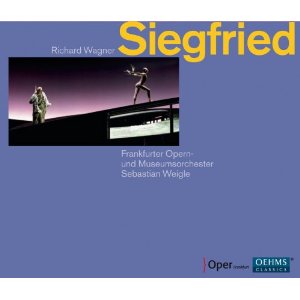This is a fascinating Siegfried, that, while certainly not lacking in power, volume, or intensity, manages to come across as an almost chamber-like performance. Recorded live at different times during October and November, 2011 at the Frankfurt Opera, more than ever you get the feeling that this is the Ring’s Scherzo. The back and forth between Siegfried and Mime in the first act is sassy and natural; Mime and the Wanderer actually seem to be playing off one another; and Mime’s commentary during the Forging Song is delightfully nasty. The text is always audible and diction is superb; so is the voice/orchestral balance.
The scene changes are handled with true craft—the Wanderer exits, and Mime’s paranoid, fearful vision takes him over for a minute until Siegfried enters quickly and Mime resorts to his obsessed, scheming self. Mime’s description of the “evil dragon”, with the Dragon Leitmotif churning underneath each word, is immediately dissipated by Siegfried’s question about the Dragon’s lair, accompanied by the Forest music that gently takes the ginger out of Mime’s attempts to scare Siegfried.
The start of Act 2, the Alberich scene, introduces us to a sound darker than anything in the first act, with the Wagner tuba prominent but not bullying. And the ensuing Wanderer/Alberich duet is a gem: the former calm, the latter manic and desperate. With Mime and Siegfried’s entrance—out of the gloom to the tune of the Forging Song, with the strings almost playful—we are again transported to another mood, quickly and effortlessly. And in the last act, after a resigned, doom-laden exchange between Erda and the Wanderer, the final confrontation between Grandfather and Grandson seems to be told from Siegfried’s vantage point—energy is not sapped, the scene ends on an exhilarating note, and our dumb hero’s energy and optimism win us over immediately, never looking back. It’s very exciting storytelling.
I suspect this bright “tinta” is due not only to conductor Sebastian Weigle’s leadership and the surprisingly brilliant playing by the Frankfurt forces, whose brass is shiny and whose strings shimmer, but also to two other factors: the spotless recording, in which the harps and triangle can be heard even when up against the full complement of strings and winds, and to the casting. In Lance Ryan, the Siegfried, we have a true tenor, rather than the usual bari-tenor—he studied with Gianni Raimondi and Carlo Bergonzi, and they clearly emphasized keeping the tone forward and clear. Ryan has no problem with high notes—he even articulates, right on the note, the high C in his weird entrance laughter—and his Forging Song is absolutely joyful, rather than the chore it all too often sounds like. I’m not certain how and when the recording sessions took place, but he is as energetic, text-conscious, and dynamic-sensitive in the last 45 minutes of the opera as he is earlier. He’s the finest Siegfried I’ve heard in years, and if the voice lacks the breadth of, say, Melchior’s, whose doesn’t? This is a Windgassen-like tenor, but with more potency and security.
Also helping this shiny “tinta” is the Wanderer of Terje Stensvold, a pure Heldenbariton whose low notes are always there but without the woolly darkness of Hotter. I’d never heard him before and assumed he was new to the opera world; in fact, he is 68 years old and has been singing for decades, with no deterioration of the voice’s core. As suggested above, his Wotan can be playful and grave by turns; godlike and ready to give up his godhood. It is a wonderful performance.
Susan Bullock’s Brünnhilde is a dud, almost through no fault of her own. Intelligent, inherently musical, sensitive to the character’s predicament and transformation, she has everything but a voice anyone wants to hear. Below the staff it is merely matronly and unpretty; above the staff it is pretty ghastly. She hardly ruins the performance, and at times approaches the heroic, but how joyous this show might have been with a closing 35 minutes of great singing! Peter Marsh’s Mime is just right, and there are moments in Act 1 when he and Lance Ryan sound very much alike; the voice is laser-focused. Of course he exaggerates at times, but not nearly as much as some old-timers like Gerhard Stolze, and he is properly creepy. Jochen Schmeckenbecher’s Alberich (say that three times, fast!) is not as dark as we’re accustomed to (Neidlinger, Kelemann), but he’s nicely grimy nonetheless. Magnus Baldvinsson’s Fafner becomes all too human, wonderfully curious about the boy who kills him, and Meredith Arwady’s Erda, assisted by crucial stillness from Weigle’s baton, makes the best of her scene, albeit with a wide vibrato. Kateryna Kasper’s Woodbird is fine.
And again, Weigle’s leadership is paramount. He has no fear of pulling out all the stops, but he never drowns out the singers; inner voices—suggestive Leitmotifs—are audible but not awkwardly underlined. His timings are unexceptional (a 75-minute second act seems quick, but makes sense; and the other two, at about 79 minutes each, are par) and wisely judged. Each act ends with an entire minute or more of applause and cheering. I would not dream of doing without the Solti or Clemens Krauss (’53, Bayreuth) or the Keilberth (Bayreuth, ’55), but along with Barenboim’s Teldec recording, this “modern” set is a keeper.
































